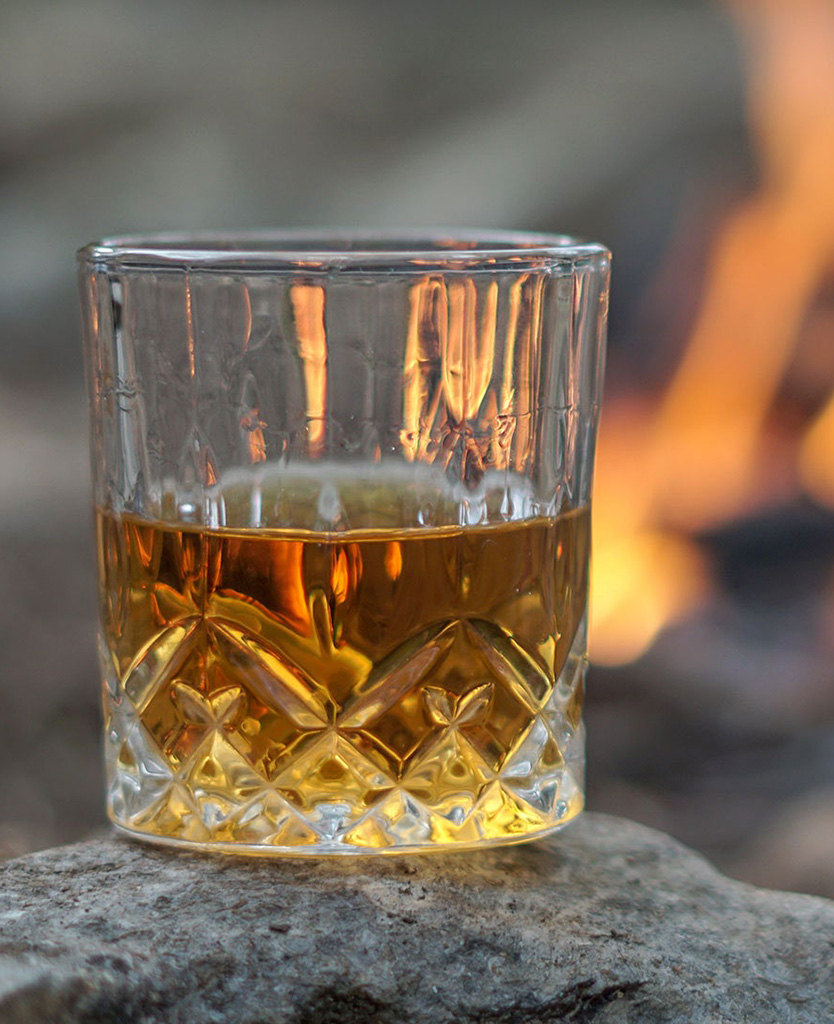Whisky vs. Whiskey

aged
oaked
Grain
whisk(e)y
Some of the earliest distilleries in Scotland spelled it whisky while the Irish spelled it whiskey with the ’e.’ The difference in spelling originates from the translations of the word from Scottish and Irish Gaelic forms. In Gaelic, the word whiskey comes from ‘uisce beatha,’ meaning water of life. Some historians claim it was more 19th century marketing-related. That is, Irish distillers added the ‘e’ to distinguish their product from the sub-standard Scotch that was flooding the market at the time.
Whiskey with the extra ‘e’ is also used when referring to American whiskies which was a result of distilling brought to the United States by Irish immigrants in the 1700s. Essentially, every country in the world spells whisky without the ‘e’ except the US and Ireland.
What's the Difference?
From this point forward (in this article) we will use the American (US) spelling of whiskey since that’s the version we produce at Black Flannel Distilling Co.
After spelling, the next question people usually have is, are they the same thing? Yes, and no. All whiskies have similar origins in that they are made from what is basically beer. A mixture of grains, mostly corn, barley, wheat and/or rye, are fermented and produce alcohol. The alcohol from this mixture is distilled into whiskey.
Beyond this is where whiskies produced in different countries begin to diverge based on ingredients, recipes, process, and production equipment. Here, we give a brief overview that should provide a point of reference as you proceed on your whiskey journey.
Regions of Whisk(e)y
American Whiskey
Though Canada is part of (North) America, American whiskey is meant to refer to any whiskey produced in the United States. There are further subcategories of American whiskey based on how it’s made. For example, bourbon is a straight whiskey distilled from a mash using at least 51 percent corn in addition to malt and rye. Other varieties have a higher percentage of a specific ingredient such as rye whiskey, oat whiskey, corn whiskey, malt whiskey, and so forth. There are also blended, light, and straight whiskies. Tennessee gets its own designation (think Jack Daniels). American whiskies tend to be sweeter than other whiskies. American whiskies must be distilled in America and aged in barrels in order to be labeled as whiskey.
Scotch Whisky
Scotch has two whisky types; malt and grain, in five categories; single malt, single grain, blended scotch, blended malt, and blended grain. Each region that produces in Scotland has their own distinct features and character; Speyside, Highland and Islands, Lowlands, Islay, and Campbeltown. Click here to see our detailed post on Scotch whisky.
Irish Whiskey
Irish whiskey is made from grain or malt and sometimes in a pot still. There is actually a pot still designation of Irish whiskey that is not a malt whiskey. But malt whiskey made in Ireland uses a pot still. How’s that for clarity? To be clear (no really), there are 4 Irish designations; malt, grain, pot still, and blended Irish whiskies.
Canadian Whisky
Canadian whiskies are usually blended whiskies made from multiple grain products. They contain a large percentage of corn, and are lighter and smoother than other whiskies. Canadian distillers sometimes add small amounts of rye which are referred to as “rye.” Rye whisky and Canadian whisky are used interchangeably in Canada (defined in Canadian law); They refer to the same product.
Japanese Whisky
Japanese distilling is only a century old but they have developed their own unique styles that have met with acclaim in recent years. Flavors range from light and very precise to smoky and fat. Bearing some similarity to the range of whisky produced in Scotland, Japanese malts and blends show a nice cross section of most all whisky styles available worldwide. Their designations include single grain, single malt, vatted malt, coffey malt, and blended Japanese.
Other Whisky
Other countries produce their own varieties of whisky based on local terroir. These include France, India, Wales, England, Taiwan, and Sweden, to name a few.
Service Notes:
Serve alone in a rocks or glencairn glass. Neat (straight no ice or water), with water on the side, with 1 large square / round ice cube, or any number of great classic cocktails.